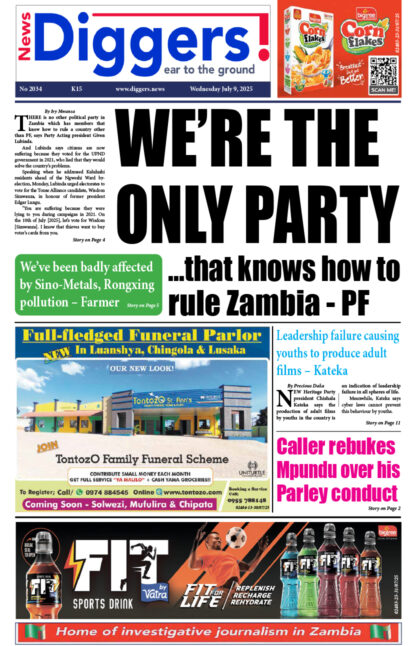Chief Government Spokesperson Dora Siliya says Cabinet has passed a resolution to put in place measures that will prevent excessive intake of alcohol among citizens, following worrying statistics that indicate that 42 percent of Zambia women drink excessively.
And Siliya says it cannot be that President Edgar Lungu knew about the Constitutional Court ruling on ministers stay in office, a day before it was delivered; contrary to the statement made by State House press aide Amos Chanda.
Addressing journalists at her office yesterday, Siliya who doubles as Minister of Information and Broadcasting said government had observed that alcohol intake beyond recommended levels had let to health consequences among Zambians.
She added that statistics placed Zambian women among the worst drunkards in the world, a vice that was promoting promiscuity in the country.
“Cabinet approved implementation of of the national alcohol policy, particularly that alcohol intake beyond recommended levels which puts people more at risk of consequences associated with alcohol like developing cancers, causing accidents, gender based violence, promiscuity, mental illness and low birth weight in children born from drinking mothers,” she said.
“Worse still for Zambia, a World Health Organisation (WHO) survey has shown that Zambian women are the biggest customers of alcohol in the world and this is a very big challenge for government because women are considered to be a force to help curb alcoholism and prevent alcohol related harm in the children. But evidence suggests that 42 percent of Zambian women drink excessively.”
She said the local government and police would work hand in hand to regulate the time that bars and clubs operate.
“This is meant to encourage self regulation of alcohol intake through learning institutions, churches and gender communities, as well as the Ministry of Health on the dangers of alcohol intake, as it affects women. Also key will be the Ministry of Local Government and the Police on enforcing laws on underage drinking and the operating ours or these drinking places. The law has always been there but not enforced,” she said.
And Siliya said Cabinet also resolved to reposes all significant heritage sites that were in private hands.
“Cabinet also approved that the national heritage conservation Commission takes over the ownership of all significant heritage sites that are in private hands using a well fortified compulsory acquisition mechanism and further negotiate with individuals in instances where such heritage sites are in private hands,” Siliya said.
Meanwhile Siliya struggled to explain how different Chanda’s remarks were from President Lungu’s statements in Solwezi last year where he said he had information that Constitutional Court judges had decided to disqualify him from the 2021 presidential race, and warned them against doing so.
“Responding to questions during a press briefing at her office yesterday in Lusaka, Siliya said Chanda was giving his “personal position”.
“I think the two incidences of what the President said in Solwezi and what Mr Amos Chanda is supposed to have said are different. I haven’t spoken to him about this yet, but I think that what the President said in Solwezi was put out of context, I think that these things are not related, I don’t believe…I think the President, coming from a legal background, he has emphasised many times that the Judiciary in this country is quite independent. If it wasn’t so, why would government in fact ever get judgments that were not in its favour? I actually haven’t seen or read or spoken to Mr Chanda about this particular issue. But my understanding when I actually saw it…I don’t know what Amos Chanda said, but my understanding would have been that by the time the President was signing this [Sovereign Guarantee loan for Zesco], and the delay was to anticipate that tomorrow there is a judgment…because I think if I recall, the judgment was coming on the 8th or the 9th, you can correct me,” Siliya explained.
“I don’t know what Amos said but as far as government is concerned, and the President is concerned, here is the logical sequence of events; the proposal to sign this loan was on the 8th but clearly, government had to wait and see what decision the court will make the following day. I do not believe that the President was aware of that decision. I think the decision that was made was; ‘let us wait for the ConCourt to make the decision tomorrow’. If my colleague, Amos Chanda, knew by whichever way what that decision was going to be, I don’t think the rest of us did. What I am aware of is that, indeed, the decision was to wait for the decision of the ConCourt and, unfortunately, the decision of the ConCourt went against government. So, the President became the acting Minister of all ministries and this is why sometime in September, he signed the Sovereign Guarantee as Minister because there were no ministers. He had not appointed a full Cabinet then, I think that was the full logic of events.”
She insisted that suggesting that Chanda’s revelation that State House knew of the ConCourt’s ruling before time implied an inaccurate reflection of the exact order of events.
“To say that, State House, and in this case you are probably saying the President, I do not think that’s the correct situation. Maybe, there were words used wrongly. But what I am sure of is that the decision was to wait for the ConCourt to make a decision the next day, not that we knew what the ConCourt [ruling] was going to be. Government never knows what these judges are going to decide because we are true believers that there is Government, there is Parliament and there is the Judiciary. And if we had undue influence on the Judiciary, why would we get any judgment against us? I think that should reflect to you that if the purpose of knowing this judgment was to influence, why would we get any judgment against us? So, I don’t believe it’s a true reflection to say that State House knew. I think the decision was to say, ‘let us wait to hear what the ConCourt would say’ so that we do not [make] invalid a signature on behalf of Zambia for a very important investment,” Siliya narrated.
She further said that the President’s reference to the Judiciary in Solwezi late last year had been grossly misunderstood.
“The President was purely talking about himself that, indeed, if there are people out there… and not necessarily the judges, but that if the PF wanted him to stand, I mean, clearly, those who are his supporters would be angry in an event that he was not allowed to stand. I think the President made that statement in that context, if Mr Amos Chanda in his verbatim told you that ‘we knew’, I think he must be talking about himself,” she said.
“I don’t believe that the President would have been aware of the judgment of the ConCourt because the courts don’t report to the President in terms of judgment, they don’t do that. If Mr Chanda as a person told you that, I think it’s him you must ask how he knew. But I can put the position of government very clear that the position was, ‘let us be cautious.’ If this signature is put today and it becomes invalid tomorrow, how are we going to manage? Let us wait and just be cautious on how the court will rule tomorrow. And I think that if you are about to make a major decision, you would rather wait and hear what the courts will say. Now, Mr Amos’ words, I can’t put or take them from his mouth, I believe you will have to follow up with him. But I can speak for government that it was purely being cautious that let us wait for the judgment. When the judgment is out, then we will decide what to do and the judgment came out, then it made sense that, fine then, the President since he’s acting when the Cabinet is dissolved, he’s acting for all ministers.”
Meanwhile, Siliya said Zambians would never lose confidence in the independence of the judiciary because government had always supported its independence and that of each arm of government.
“I think that the people of Zambia have not lost confidence in the Judiciary; I think that government in general and the people of Zambia have given a lot of support to the Judiciary. I think Zambia stands out among few African countries where we can be quite proud that we’ve traditionally carried out the processes of our courts and as far as our courts are concerned, there is no Zambian who is special. We’ve seen [Republican] presidents appear before court. I think we should be proud of our court record. If one official, whether literally or by just use of language, gave an impression that the courts report to State House, I don’t believe that the reason to say that the judicial system in this country is not working correctly, I don’t believe so,” said Siliya.



















